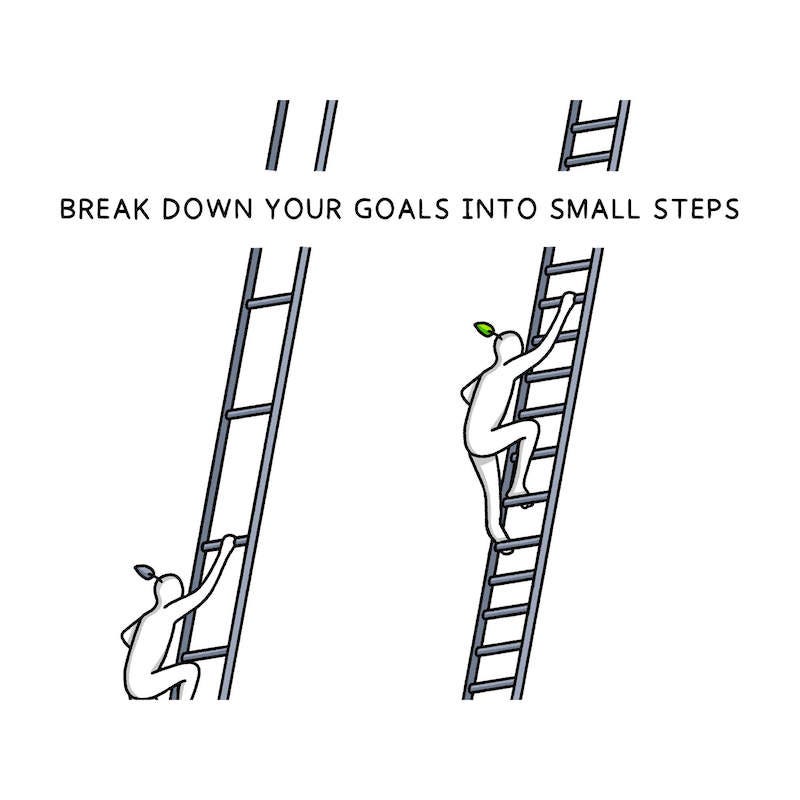Here’s how to do it without a Ph.D
Goals are stupid.
They’re a hand-wavy hipster idea from the Woodstock festival days. A goal is hope. A goal is procrastination. A goal is a “that’d be nice to have.”
Then life gets in the way and slaps you in your pretty face.
Recently a student in my academy emailed me.
 Learn More
Learn More“I got 6 of your courses 6 months ago and haven’t started any of them yet. I plan to do them in April (3 months away).”
My face went red. I wanted to throw my office chair at the window.
When I broke down why April was the magic month for him to finally start taking action, I could see the problem with his goal.
He believes that’s when he’ll be free. Right now that date is so far away it looks like it could work. But as the days catch up with him nothing will happen. Life will get in the way.
My student is the perfect example of why goals without systems are useless.
I’ve used systems over the last 9 years to:
- Lose 10 KG and my beer belly
- Write 5000+ long-form articles on the internet
- Get a book deal with a major publisher
- Build a 7-figure online business
Systems are a piece of piss once you understand them from a different viewpoint than the one you’ve probably seen them through.
Let’s ensure you don’t accidentally make the same mistake as my student. Use this proven process.
Read also: 5 daily habits of people that are smart with money
Why it’s worth spending your precious time to build a system
A system requires an investment of time. Therefore, you must address the why to convince yourself it’s worth it. Let me pitch you.
Amateurs have a goal. Professionals have a process.
1. No motivation is needed when there’s a system
The biggest trap of trying to become successful at anything in life is feeling motivated. When you get home from work you feel exhausted.
The thought of going and building a side hustle feels like too much. If all you have are goals to rely on then you’re screwed.
Brain: “Do I feel motivated to do this goal today? No.”
So we go straight to the couch and Netflix and chill. This process unconsciously repeats for many years (or forever) when there’s no system.
2. Systems are a bizarre enabler of happiness
Goals are a form of seeking happiness.
The problem is when we keep putting them off it makes us miserable. Systems work differently. Once you have a well-oiled system working for you _all _it takes to be happy most days is for the system to operate.
If the system works then you feel good even if the results aren’t flowing through yet.
3. Systems enable consistency. Consistency creates success.
You’ve been beaten over the head with the importance of consistency.
You know you need it, but that doesn’t make it any easier to be consistent. A system does. Systems are the automation parts of goals.
If a system is implemented, iterated upon and left to run for a few years, it has a much greater chance of creating success than a standalone goal with zero support and reliance on free time.
Free time is a lie. You make time or you don’t.
4. A weird vaccine for burnout
The word burnout is thrown around like my daughter’s rag doll. People love to say they’re burnt out. But they often misunderstand why.
You don’t burn out from working too much. You burn out from not having a system.
When there’s a working system it makes things easier. A good system isn’t static either. Over time a system gets better.
The system that runs my online business started with me sending lots of manual emails. Now those emails are automated and sorted without me. There’s a schedule of emails too. No guessing. No accidents.
Without a basic system I wouldn’t have had the time to see what works and what doesn’t and then improve it.
Systems = Gorgeous execution in disguise
5. The biggest benefit of systems
We’re taught that negotiating in life makes us badass.
That’s true. But when you rely on goals and not systems you have to negotiate with yourself every day.
- Do I have time?
- Do I feel like it today?
- Do I even want this goal?
- Should I keep doing this goal?
When there’s a system in place the negotiation ends.
Writer David Liszewski wrote as a comment on this article, “A system will allow your brain to make less decisions.”
He’s bang on. We all suffer from decision fatigue at some level. Let systems be the panacea and automate decisions.
The system that changed my life forever
Over the last 9 years I’ve written online and had some tiny success.
Many critics said I got lucky or was born with millions in the bank. Hardly. What people bizarrely miss is I don’t have writing talent, I just have a killer writing system.
It happened by accident. I worked a 9–5 job and didn’t have a lot of free time. So my only choice was to design a lean system after hours.
Over the years I made the system more efficient out of survival, not intelligence. If the system failed then I couldn’t write in my spare time. Simple. As the system began to produce more results, I went from 5 days to 4 days a week at my job.
A year ago I quit my job thanks to this writing system. I don’t say that to brag. I tell you because systems work.
The fast way to set up a system and have it transform your life in 90 days
Let’s get to the meat in the ham and salad sandwich.
A system helps create a habit. A habit takes 90 days to form. If you have a system then you can get a life-changing habit. The progress will become a drug more addictive than heroin.
1. Make the first step in a system smaller
Exercise is a pain in the ass.
Going to the gym with a bunch of sweaty strangers stuck in a big white room, like pigs in the back of a truck on their way to slaughter, isn’t fun.
Just the idea of gym is enough for more than 50% of people to sign up for a membership and fail. When I lost my exercise habit, thanks to the 2020 bat virus, it became hard to get my fitness system back.
All I did is make the first step tiny.
I made the only action in the first week to get to the gym, open the door, and then come home again. It won’t surprise you to know I didn’t fail.
Complicated new systems don’t get followed. Make your system have a first step that’s simple-stupid.
A simple system requires less activation energy to get started. And the image in your mind will appear smaller, so it won’t block your action muscles from getting started.
First steps should be tiny so they’re laughable.
2. Screw with the goal to reframe it
The founder of Gumroad Sahil Lavingia is a master of systems and says:
Start a side project instead of a company. Write a blog post instead of a book. Lower the stakes to increase the odds.
When I sat down to write my first book it felt hard. So I stopped trying to write a book. I threw a tantrum and gave up like a baby.
Months later I went back to it. This time my only goal was to write a chapter using one article I’d already written. Piece of piss.
Within a few weeks I had all the chapters of the book.
The same happened with career transition. Finding a new career in 2019 after being publicly fired and feeling unbelievably embarrassed felt worse than death. I reframed the goal with a new system.
My system was to have two conversations a week with a recruiter or hiring manager instead of doing a nerve-racking job interview.
Eventually these conversations led to a job that wasn’t advertised.
Systems operate better on smaller goals. As the results happen, the system can be expanded to make the goal bigger.
3. Break goals down
A goal is like a vision.
The challenge is unless you break down a goal it’s impossible to design a system around it. You need to know all the parts that make up the sum.

Image credit: Ash Lamb via this tweet (follow him)
Right now I have a goal to buy a house — it’s overwhelming. So all I did is break down the process.
- Apply for a home loan
- Get approved for a loan
- Find houses
- Inspect houses
- Get building inspections
- Attend auctions. Place bids.
- Win an auction and sign the contract
- Get repairs done
- Move into home
I broke the system down needed to buy a home. Then I selected a few pieces to act on. The two easiest were 1) turn on notifications for properties for sale in my area 2) create a house-buying checklist. Those two tasks gave me momentum.
The best systems are momentum enablers.
Read also: 9 powerful truths that will change your life forever
Final Thought
Stop wasting your life with airy-fairy goals. It gets you nowhere.
Take your goal, break it down into tiny pieces, and make it a system so simple a 5 year old could follow it. Then expand the system as it produces results. That’s how you transform your life with systems.
Contributed by Tim Denning
For more information and updates join our WhatsApp group HERE
Follow us on Twitter HERE
JOin our Telegram group HERE













![The 17 Habits Of Truly Wealthy People That you can easily adopt now [Real powerful stuff]](https://worldfamilydigest.com/wp-content/uploads/2022/02/FA033A84-800B-424D-8DEA-2BB8AD9E91F6-100x70.jpeg)

